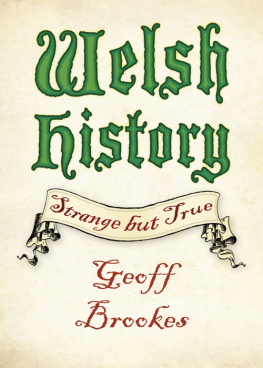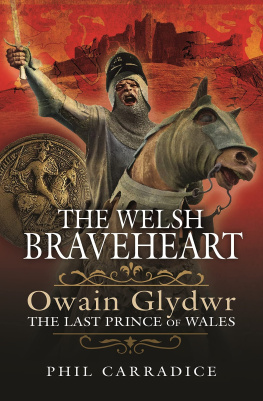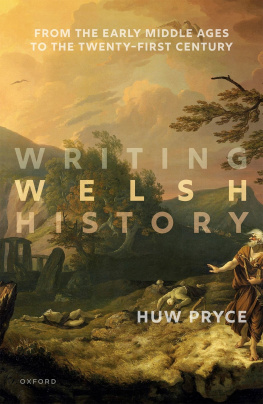The Economy of Medieval Wales, 10671536
The Economy of Medieval Wales, 10671536
MATTHEW FRANK STEVENS
Matthew Frank Stevens, 2019
All rights reserved. No part of this book may be reproduced in any material form (including photocopying or storing it in any medium by electronic means and whether or not transiently or incidentally to some other use of this publication) without the written permission of the copyright owner except in accordance with the provisions of the Copyright, Designs and Patents Act 1988. Applications for the copyright owners written permission to reproduce any part of this publication should be addressed to The University of Wales Press, University Registry, King Edward VII Avenue, Cardiff CF10 3NS
www.uwp.co.uk
British Library Cataloguing-in-Publication Data
A catalogue record for this book is available from the British Library.
ISBN: 978-1-78683-484-3
e-ISBN: 978-1-78683-486-7
The right of Matthew Frank Stevens to be identified as author of this work has been asserted by him in accordance with sections 77 and 79 of the Copyright, Designs and Patents Act 1988.
This book is a substantial expansion of a chapter in a forthcoming volume to be published by Brill, A Companion to Medieval Wales , ed. Emma Cavell and Kathryn Hurlock (Brill: Leiden and Boston), forthcoming.
The publisher has no responsibility for the persistence or accuracy of URLs for any external or third-party internet websites referred to in this book, and does not guarantee that any content on such websites is, or will remain, accurate or appropriate.
The cover design incorporates silver penny coins from the reigns of Stephen 113554 (Swansea mint, c.113645), Richard I 118999 or John 11991216 (Rhuddlan mint, c.11901205) and William II 10871100 (Cardiff mint, c.10905). By permission, Sovereign Rarities Ltd; Portable Antiquities Scheme; and National Museum Wales.
CONTENTS

As AN UNDERGRADUATE student at the University of Wales, Aberystwyth, as it was then known, I had the good fortune to take a final-year course on Welsh society in the later Middle Ages, taught by Dr Llinos Smith, which dealt directly or indirectly with most aspects of the economy of medieval Wales. When appointed lecturer at Swansea University in 2010, I revived Llinoss course, by then having become acquainted with the broader tapestry of pre-modern economic history. This acquaintance had come about through my PhD studies at Aberystwyth with Professor Phillipp Schofield, and my postdoctoral research at Oxford University, funded by the Economic History Society, and at the Centre for Metropolitan History, Institute of Historical Research, University of London. Setting about to teach the history of Wales for the first time, I was struck by the general absence of substantive dscussion of Wales within the well-developed historiography of the economy of medieval Britain and Europe. This is not due to a lack of suitable primary source material for study, but, one suspects, due to the view that medieval Wales, with its unfamiliar native social institutions and political fragmentation, is a sort of terra incognita when viewed from beyond Offas Dyke. However, a great deal of research regarding the economy of medieval Wales, often scattered and overlooked, has been conducted over the past century and more. This book seeks to draw that research together into a sensible narrative, relating it to English and Eopean historiography and making it accessible to students and historians alike.
Pulling this material together, and offering an accessible analysis of it, has been a most challenging task, and the reader must judge for him- or herself the degree of my success. While any failures of the text presented here are the authors alone, several people are owed particular thanks for their advice and assistance in preparing it. Foremost is Professor Stephen Rigby of Manchester University, whose advice to drastically revise the structure of the original draft, and comments on various subsequent drafts, greatly improved the final product. I must also thank Professor David Stephenson, for his comments, and Dr Emma Cavell, who inspired this monograph by prompting me to write a short chapter-length survey of the medieval economy of Wales that grew into the present book. Thanks are due to my other colleagues at Swansea University, not least Professor Martin Johns and Dr John Law and, keeping with custom, my undergraduate students of the course Welsh Society in the Later Middle Ages. Support for the completion of this project was provided by Swansea University, in the form of sabbatical leave, the British Academy (grant no.SG171150, Jim Crow in Medieval Wales: a comparative approach to the long history of legal discrimination and segregation) and the National Science Centre, Poland (Narodowe Centrum Nauki: project no. UMO-2016/22/M/HS3/00157, Social and political order of the communal towns in the European peripheries from the 12th to the 16th c., principal investigator, Professor Roman Czaja, Uniwersytet Mikoaja Kopernika, Toru). Thanks are also due to my parents and Patricia Henninger, who have kindly supported my studies.
For Monika
AgeCon. R. R. Davies, The Age of Conquest: Wales, 10671415 (Oxford, 1995)
AgHist. The Agrarian History of England and Wales , 8 vols (Cambridge, 193981)
BBCS Bulletin of the Board of Celtic Studies
Boroughs R. A. Griffiths (ed.), Boroughs of Medieval Wales (Cardiff, 1978)
DHST Denbighshire Historical Society Transactions
EcHR The Economic History Review
GlamCH T. B. Pugh (ed.), Glamorgan County History, vol. III: The Middle Ages (Cardiff, 1971)
GwentCH R. A. Griffiths, T. Hopkins and R. Howell (eds), The Gwent County History, vol. II: The Age of the Marcher Lords, c.10701536 (Cardiff, 2008)
LordSoc. R. R. Davies, Lordship and Society in the March of Wales, 12821400 (Oxford, 1978)
NLWJ National Library of Wales Journal
P&P Past and Present
SouthWales W. Rees, South Wales and the March, 12841415: A Social and Agrarian Study (Oxford, 1924)
Statutes I. Bowen (ed.), The Statutes of Wales (London, 1908)
Towns I. Soulsby, The Towns of Medieval Wales: A Study of their History, Archaeology and Early Topography (Chichester, 1983)
TransAng. Transactions of the Anglesey Antiquarian Society and Field Club
TransCymm. Transactions of the Honourable Society of Cymmrodorion
TransRoyal Transactions of the Royal Historical Society
UrbanCult. H. Fulton (ed.), Urban Culture in Medieval Wales (Cardiff, 2012)
WelshSoc. T. Jones Pierce, Medieval Welsh Society: Selected Essays , ed. J. B. Smith (Cardiff, 1972)
WHR Welsh History Review
Map 1. Wales and its borders in the eleventh century.












